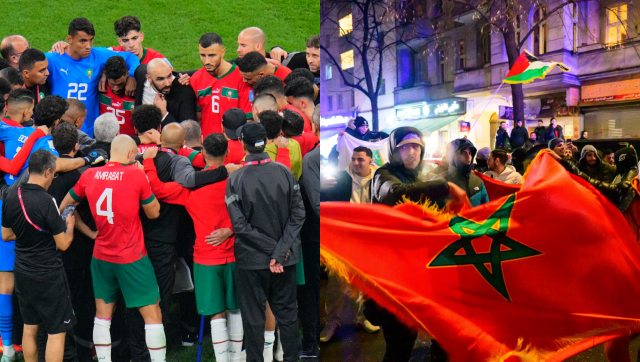Doha: After the second round and the quarter-finals, there was a sense of an ending in the Qatari capital – the denouement of the tournament was upon us, the majority of the fans and media had returned home, the streets of the city were emptying, the corniche and the malls were bereft of supporters, but on Wednesday, the city was subject to another takeover: with their drums, castanets, flags, honking and songs Morocco and their following were invading this World Cup – and reframing the debate over the cultural place of this World Cup and the country’s own identity.
#QNA_Video |
— Qatar News Agency (@QNAEnglish) December 14, 2022
Moroccan fans ignite the vibes hours ahead #Morocco vs #France match in the semi-finals of the World Cup. #QNA#WorldCupQatar2022 #Qatar_2022 #QNA_Sport #FIFAWorldCup #Morocco vs #France pic.twitter.com/heQjZp7BAu
For the first time ever, following a tense and highly-dramatic last-eight encounter with Portugal , Africa had a representative in the semi-finals of the World Cup. Yassine Bounou, Walid Regragui and the Atlas Lions eliminated the European powerhouse and Cristiano Ronaldo on their own terms – with yet again a brilliant defensive display, some flair and a great team spirit. Africa, the Arab world, the Moroccan diaspora and everyone with a football heart melted – this was undoubtedly football history. After the final whistle, Regragui shed tears of joy, Hakimi embraced his mother and Bounou celebrated with his son. These were images that were etched into the collective mind. Football, a sport where glory is often so transient, can also provide enduring memories and pose deeper questions.
Achraf Hakimi and Sofiane Boufal celebrating with mother after Morocco's quarterfinal win over Portugal 🇲🇦 Masha'Allah ❤ pic.twitter.com/YDEpbKvc6q
— • (@Al__Quraan) December 10, 2022
The victory against Portugal and the semi-final against France were about shared identity and community and yet the larger question of Moroccan identity at this World Cup was multi-faceted: the hangover of colonialism (Spain and Portugal invaded Morocco) and what and who this team represented. France was a belligerent force in Morocco until 1956 and the ties with Paris remain deep but often fractious. Eating Acai at a downtown mall, where there was little sign of the frenzy surrounding this semi-final with endless warnings on the Hayya app to ticketless fans and Qatari authorities restricting their air space to inbound flights from Morocco, Achraf, from Casablanca, said: “France is a country that we are close to culturally. It is a derby, but we identify as Moroccan. Being Moroccan makes us multicultural, diverse. We are proud Africans but at the same time we are close to Europe, only fifteen kilometers separate us. Those different ethnicities make us special. Some of us are Arabs, some of us are not.” At home, Achraf, supports Wydad AC, the club Morocco’s Paris-born coach Walid Regragui led to the African Champions League crown in 2022 and the club Yassine Bounou played for before moving to Spain. Born in Montreal, Canada, the outstanding number one with his babyface, elan and classy saves, became a tournament favourite, but his life’s story is a mirror for much of the Moroccan team. Just twelve of the 26-member squad were born in Morocco. The other players belong to the diaspora. Read | Morocco, a team of immigrants and idol sons to their mothers Born in Saudi Arabia, Achraf spent his youth in the United States and Spain where he experienced racism and being kicked out of a bus as a teenager. It’s recurring problem for members of the diaspora, in particular in France, Belgium and the Netherlands. A butcher from Brussels, Mehdi Hassani backed Hakim Ziyech and Co when they took on Belgium, arguing that there were too few opportunities for Moroccan immigrants in the Western European country. He called France the “coloniser”. “The team represents us all,” says Achraf. “We all have different lives. Other Moroccans that grew up in the Netherlands or Belgium might identify more with Ziyech than Bounou. Moroccans have a hard time to idolise someone. Bounou and the team have sent a message of hope to Moroccans and others, a message of self-belief and empowerment. Bonou deserves praise, the players are heroes for that.” But not even heroes are flawless. Bounou, Ziyech and Hakimi proffered great intensity and a Herculean effort to match the defending champions, but, ultimately France’s cunning – far outstripping Baldrick’s plans – proved too much . Morocco’s story was sweet, one that perhaps encapsulated the essence of the World Cup - its universality, not ignoring the justified criticism at the address of the host nation. After the final whistle, Inez, a Moroccan teenager in the stands with her father and her sister, wept tears of disappointment, Morocco’s dream having disintegrated in the face of the barnstorming Mbappe, but also of pride, reveling in what the Atlas Lions had represented – unity, togetherness and a sense of belonging. As she dried her tears, that feeling prevailed. Read all the Latest News ****, Trending News ****, Cricket News ****, Bollywood News ****, India News and Entertainment News here. Follow us on Facebook****, Twitter and Instagram****.


)
)
)
)
)
)
)
)
)



